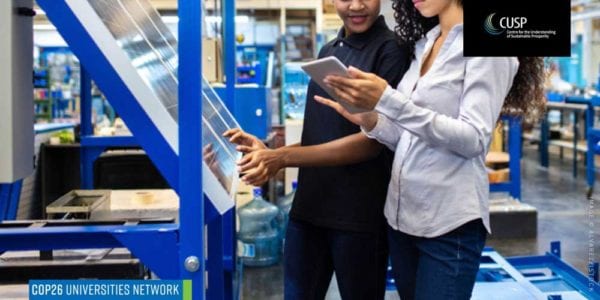Social innovation for a just transition to sustainability
At a time of climate emergency and rapid biodiversity loss, the need for transformation to a more sustainable economy and society becomes ever more urgent. Rapid change requires social innovations of different types and at different scales, Prof Fergus Lyon writes ahead of the #ISIRC2021 conference—a just transition cannot be a top-down endeavour but needs community level initiatives and actions.

How can we address the climate and ecological emergency while also maintaining and improving wellbeing? CUSP work shows how the two elements cannot be separated, but it also requires social innovation that draws together diverse evidence, breaking down the silos of knowledge that hinder the development of policy and practice.
This is a focus within the International Social Innovation Research Conference (ISIRC) with a stream on social innovation in a time of climate and biodiversity emergency currently inviting paper abstracts and ideas for panels from around the world.
Social innovation and the development of novel practices, approaches and institutions is desperately needed. This is accentuated by the pandemic and widespread calls to build back better and build back fairer. Questions remain about the best processes of encouraging the required changes.
One of the key elements of such processes is to make sure that the transition is socially and economically just: we need to ensure that certain places are not unduly disadvantaged. This requires identification of the places most at risk from negative consequences—whether it’s communities, regions or nations; we also need to be sure to work with the industries that are particularly affected. The transition to low carbon economies is an opportunity to create ‘decent work’—i.e. more stable, healthy sources of employment; and CUSP has been working on the matter in a number of projects over the past five years.
The negative impact of decarbonisation is likely to be greater in communities built on carbon-intensive industries in general, that much is clear. But we need to pay equal attention to the impact higher costs may have on all structurally marginalised and disadvantaged communities. While compensation schemes could be a reactive transition tool to avoid fallouts, the process of decarbonisation could just as much be a springboard for consciously addressing historical disadvantage and a form of reparative policy.
There are strong moral justifications for assuring a socially and economically just transition. Approaches to net zero that are not inclusive of these considerations are likely to experience strong resistance, particularly if some places or communities perceive that they are disproportionately hit. There are lessons to be learned from resistance to climate policy in USA, Brazil and France when it is seen as a form of regressive taxation and increasing inequalities.
And of course, a just transition cannot be a top-down endeavour but needs community level initiatives and actions. Technological change is undoubtedly needed, but local innovations should be encouraged as well: What can be done to reskill people in threatened jobs? What can be done to support the development of new industries and the growth of those sectors that have less resource use while maximising wellbeing? The work of CUSP shows how sustainable prosperity has to be redefined as living well within the planetary boundaries.
Now, bottom-up innovation needs particular resourcing, with the opportunity to develop localised reinvestment strategies using funds generated from carbon taxes for example. The transition will have to be based on a wide range of business models that can ensure disadvantage is tackled while also reaching aspirations of net zero. Innovative business models that go beyond the sole focus of profit maximisation will be central to this vision. The large literature on sustainable business models shows that there are opportunities for substituting fossil fuels with renewables, maximising material and energy efficiency, and the circular economy. Attention can be given to processes within firms and most importantly within their supply chains.
Innovation for a just transition also needs to consider the wider governance arrangements beyond the individual firm. Innovation in governance, in turn, needs to ensure that decision making allows just allocation of resources to reach those most in need and those most affected by decarbonisation. This has to be done in ways that command consent and generate enthusiasm. Questions around development of strategies remain: we need to make sure to include local policy makers, elected representatives, trade unions, business associations and investors; and we should always aim to include the most marginalised in particular.
Support for innovation is usually focused on economic objectives; the role of innovation in contributing to societal objectives, however, also has a long pedigree. And it has become only more important recently, for instance through ‘mission’ based funding, that included programmes targeting the green agenda as well as issues such as ageing society.
‘User engagement’ in research and innovation, which extend to communities, including marginalised communities, is fundamental to the effective operation of innovation systems—it is key to innovations taking hold on the ground and to support their diffusion and adoption. There is also a need for understanding the wider support ecosystem that includes finance providers, business support, enabling policy environments and communities of practice in general.
Around the world, there are ideas and innovations emerging, with the challenge of not only scaling up these creative solutions, but also understanding the factors hindering them, and the unintended consequences of these innovations. But most importantly, we need to firmly establish the multiple ways that help encourage other innovations for a just transition and give voices to all. These will be the conversations developed at the ISIRC conference.
About the Social Innovation Conference
For details about the ISIRC conference and the process of submitting abstracts please go to www.isirc2021milano.com and the Specific stream on Sustainability and social innovation in a time of climate and biodiversity emergency. Chairs: Fergus Lyon (Middlesex University/CUSP), Irene Garnelo-Gomez (University Of Reading), Rafael Ziegler (HEC Montreal)



